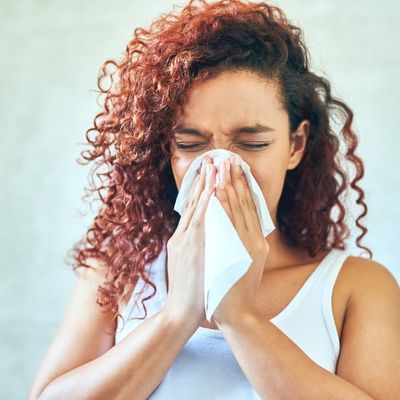
As I write this I am in bed, cough drops and tissues on the nightstand, feeling terribly sorry for myself because I have a COLD. Can you believe it?? A cold! For the past year and a half — which I, like so many, spent largely isolated — I had nary a sniffle, and now I’m practically on death’s door. By which I mean my throat hurts and my head hurts and I feel, to borrow my mother’s terminology, “cruddy.”
In the past few weeks, nearly everyone I know has had this cold. My colleague Kerensa had a light cough and a scratchy throat and said she briefly sounded like Lindsay Lohan. My colleague Matthew developed a similar croak — he assumes as a result of a mostly resumed social life in New York, where vaccination rates are high (as is party fever). And Izzy got the cold (runny nose, sore throat) from her kids, even though they’re still wearing masks at school. Somehow this cold feels uniquely unpleasant, even if this is something we used to deal with once or twice a year.
To find out whether there really is anything special about the cold(s) going around now, or whether we’re just a bunch of big babies, I spoke to Darvin Scott Smith, an infectious-disease physician at Kaiser Permanente, and Bernard Camins, the medical director for infection prevention at the Mount Sinai Health System.
What’s the deal with the cold circulating now?
While a cold may feel especially miserable right now, after nearly two years without one, it’s nothing we haven’t seen before, says Smith. That said, the summer 2021 cold might legitimately be on the worse end of the common-cold spectrum for a number of reasons. “The type of virus that circulates this time of year is the enterovirus, which could be a bit more severe,” says Smith. “You’d notice it a lot more” than the usual milder winter colds, he adds.
Among children, who are now playing with each other (sometimes unmasked) for the first time in a long time, another cold virus — RSV, or respiratory syncytial virus — is also dominant, and while it’s usually mild for adults, it may be unusually widespread because most kids missed the typical RSV timeline, which is to get it in the winter.
How do I know it’s just a cold and not COVID?
In short: You don’t, unless you get tested. Even if you’ve been vaccinated, there’s a chance you can still contract COVID, and experience mild, coldlike symptoms, says Camins. And according to some physicians, symptoms associated with the Delta variant are even closer in profile to ordinary colds (though, Camins says, we need more data to be sure).
Either way, COVID and the common cold have significant overlap, so it’s something we should always have “in the back of our minds,” says Smith. Both viruses can include the following symptoms, he says: runny nose, headache, sore throat, feeling a bit “off” (or cruddy).
Though many Americans are now fully vaccinated, and the COVID risk has dramatically decreased, the pandemic isn’t over, and so it’s more important than ever to stay home when you’re sick, says Camins. “We have seen some people [recently] with mild COVID symptoms, who think it’s a cold, who then go to work with COVID,” he says. COVID remains dangerous to unvaccinated people, of course, so it’s important to isolate and get tested, if possible, to rule it out.
What should I do if I get sick?
The advice for treating the common cold — which, alas, lacks a reliable cure — is much the same as ever, plus that extra-firm recommendation to stay home: rest, drink plenty of fluids, and use over-the-counter medicines as needed for nasal congestion and headache. Both Smith and Camins advise that people sick with colds wear a mask outside the house if visiting indoor places (like the grocery store) is necessary; the fact that we went so long without colds “goes to show that the same things we apply to COVID will apply to other respiratory viruses,” says Camins. That means frequent hand-washing, covering our mouths when we cough or sneeze (or, better yet, wearing masks when we feel at all ill), and isolating all work for colds, too.
And as another form of prevention, Smith urges those eligible to get vaccinated against both COVID and the flu this fall. “Making sure you’re vaccinated against flu and COVID is critical to managing these things, because all of these viruses can be confused with colds, and that overlap should entice us to get vaccinated,” he says.





